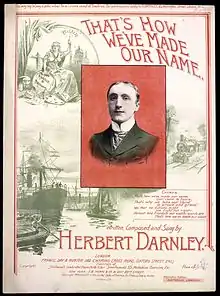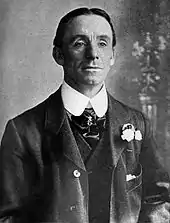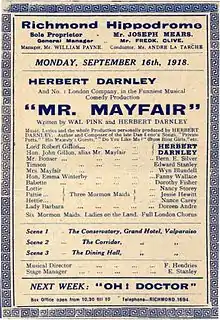Herbert Darnley
Herbert Darnley (12 May 1872 – 1947), real name Herbert Walter McCarthy, was a British music hall comedian, song writer, popular early recording artist and theatrical producer, active from the 1890s until the early 1940s, who claimed descent from Edmund Kean.[1]



Early life
Herbert was born Herbert Walter McCarthy in Chatham in Kent, England.
Dan Leno
From the 1890s, Darnley was the major song writer for "The King's jester" Dan Leno.[2] Darnley's Mr Wix of Wickham toured in 1902,[3] starting at the Borough Theatre, Stratford in July. It starred Leno in a male lead role as Mr Wix who performed his signature clog dance and appeared with his daughter Georgina.[4] The production opened in New York around 1904 or 1905 with over half the song composed by Jerome Kern.[5]
"God Save the King"
In 1902, Darnley released a recording of "God Save the King". The introducer claimed the song to have been written by Henry Carey and that Darnley was his descendant.[6]
Fred Karno
In 1906, Darnley was mentioned as general manager and producer in advertising for Fred Karno's companies, second only to Karno himself.[7]
Film
A Darnley ballad was adapted for a nine-minute silent film, Napoleon and the English Sailor, released by Gaumont in 1908, in which he also starred. Shortly afterwards, Gaumont produced a version of Darnley's sketch Moving In using members of his own troupe.[8][9]
Murder
Darnley wrote By Whose Hand?, a murder story that was staged at the Pavilion Theatre in Leicester, in 1929 in which Dolores played the lead. Darnley gave a speech in which he said he was pleased to remove Dolores from the "human wolves" of London who "were trying to tear her to pieces."[10][11] The production toured throughout 1929, reaching Mexborough and the Theatre Royal, Sheffield.[10]
William Hickey
In 1934, Darnley was profiled in the William Hickey "These Names Make News" column in The Daily Express. Darnley was said to have claimed a family history going back more than 250 years in show business, including Edmund Kean and Henry Carey and to have personally started in the business aged 5. The column noted his "sweepstake attitude to life" and his many highs and lows, including owning two theatres, losing thousands in theatrical productions and sleeping rough on the embankment next to the River Thames.[1]
Death
In January 1943, Darnley was playing Widow Twankey in the pantomime Aladdin and His Lamp at the Theatre Royal, Exeter which may be his last professional engagement. He died in 1947.[12]
Selected songs
- "That's How We've Made Our Name" (1898)
- "My Way Is Your Way" (1900)
- "My Next Door Neighbour's Garden"
- "What Do You Think of the Irish?"
- "Sons of Our Empire"
- "Some Mother Will Lose a Son"
References
- "Wightman Selectors' Burden", William Hickey, Daily Express, 15 May 1934, p. 6.
- Anthony, Barry. (2010). The King's Jester: The Life of Dan Leno, Victorian Comic Genius. London: I.B.Tauris. p. 106. ISBN 978-0-85773-104-3.
- Baker, Richard Anthony. (2014). British Music Hall: An Illustrated History. Barnsley: Pen and Sword. p. 35. ISBN 978-1-78383-118-0.
- Anthony, 2010, p. 192.
- Banfield, Stephen. (2006). Jerome Kern. New Haven: Yale University Press. p. 11. ISBN 0-300-13833-4.
- God Save The King by Herbert Darnley (1902) Internet Archive. Retrieved 9 October 2014.
- Robinson, David. (1984). Chaplin, the Mirror of Opinion. Bloomington: Indiana University Press. p. 10. ISBN 0-253-21160-3.
- Gaudreault, André; Nicolas Dulac; Santiago Hidalgo. (Eds.) (2012). A Companion to Early Cinema. John Wiley. p. 471. ISBN 978-1-118-29387-4.
- Herbert Darnley. BFI Film Forever. Retrieved 10 October 2014.
- Whittington-Egan, Richard. (1972) The Ordeal of Philip Yale Drew: A Real Life Murder Melodrama in Three Acts. London: Harrap, pp. 259–278. ISBN 0245597301
- "A Suicide Club That Made London Gasp", Miami Daily News, 21 April 1929, p. 9.
- England & Wales deaths 1837–2007 Transcription. findmypast.co.uk. Retrieved 10 October 2014. (subscription required)
External links
- Herbert Darnley singing "God Save the King".
- Herbert Darnley singing "My Next Door Neighbour's Garden".
- http://footlightnotes.tumblr.com/post/93596553905/herbert-darnley-1872-1947-english-actor
- https://books.google.com/books/about/What_Should_a_Woman_Do_A_Novel_Founded_o.html?id=n432MgEACAAJ&redir_esc=y
- http://www.angloboerwarmuseum.com/Boer66_picture_press3.html